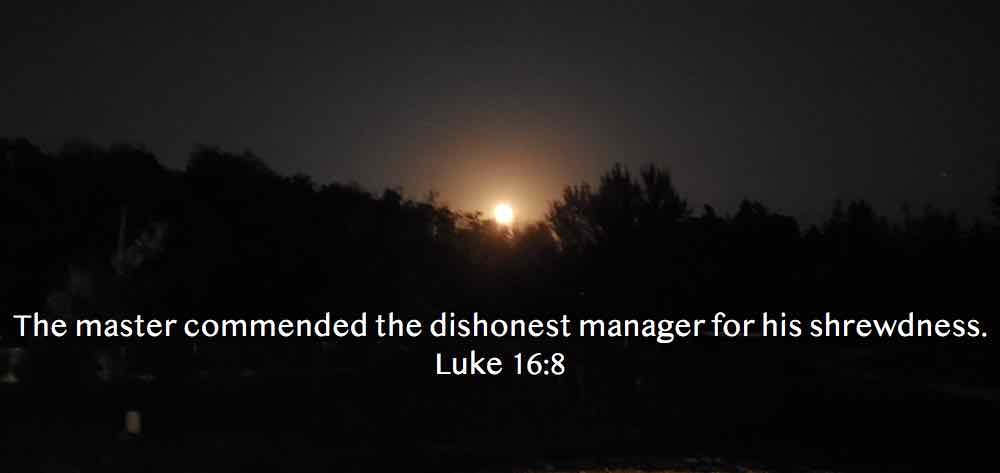September 7, 2025

Luke 16:1–18 ESV
He also said to the disciples, “There was a rich man who had a manager, and charges were brought to him that this man was wasting his possessions. And he called him and said to him, ‘What is this that I hear about you? Turn in the account of your management, for you can no longer be manager.’ And the manager said to himself, ‘What shall I do, since my master is taking the management away from me? I am not strong enough to dig, and I am ashamed to beg. I have decided what to do, so that when I am removed from management, people may receive me into their houses.’ So, summoning his master’s debtors one by one, he said to the first, ‘How much do you owe my master?’ He said, ‘A hundred measures of oil.’ He said to him, ‘Take your bill, and sit down quickly and write fifty.’ Then he said to another, ‘And how much do you owe?’ He said, ‘A hundred measures of wheat.’ He said to him, ‘Take your bill, and write eighty.’ The master commended the dishonest manager for his shrewdness. For the sons of this world are more shrewd in dealing with their own generation than the sons of light. And I tell you, make friends for yourselves by means of unrighteous wealth, so that when it fails they may receive you into the eternal dwellings. “One who is faithful in a very little is also faithful in much, and one who is dishonest in a very little is also dishonest in much. If then you have not been faithful in the unrighteous wealth, who will entrust to you the true riches? And if you have not been faithful in that which is another’s, who will give you that which is your own? No servant can serve two masters, for either he will hate the one and love the other, or he will be devoted to the one and despise the other. You cannot serve God and money.” The Pharisees, who were lovers of money, heard all these things, and they ridiculed him. And he said to them, “You are those who justify yourselves before men, but God knows your hearts. For what is exalted among men is an abomination in the sight of God. “The Law and the Prophets were until John; since then the good news of the kingdom of God is preached, and everyone forces his way into it. But it is easier for heaven and earth to pass away than for one dot of the Law to become void. “Everyone who divorces his wife and marries another commits adultery, and he who marries a woman divorced from her husband commits adultery.
Discussion Questions:
We would like to take this parable and its many lessons over a two week period.
For this first week we would like to explore the parable itself and discuss how it applied during the first advent.
Discussion Summary:
This parable, unlike others, should not be read as a 1 to 1 correspondency. This is not a parable that describes in symbol what is happening. It is not a parable that describes behaviour that one should emulate. Instead, by presenting an exaggerated, fantastical scenario it invites the listeners/readers to compare their own attitude and behaviour with the view of correcting themselves.
Previously, Jesus had given to the religious leaders of his day the parable of the prodigal son. That parable described their behaviour as they saw the poor and the sinners respond to Jesus’ ministry and repent. In that parable they were represented by the older son who had not wasted his inheritance. In this parable of the unjust steward, the religious leaders of the day are compared to a steward who did not manage his responsibilities properly. The dishonesty of the steward is not the point of comparison. The shrewedness of the steward is the point of comparison for the religious leaders of Jesus’ day.
Jesus identified the religious leaders as having the role of manager or steward to the rest of the nation in Matthew 23:2. But their poor management of this responsibility caused John the Baptist to deny them baptism as we read in Matthew 3:7-12. By comparing the shrewdness of the unjust steward who showed mercy to those who owed debts, they should have realized that the first steps of repentance should have been showing mercy to the poor and the sinners. This was a call for them to soften their hearts.
Leave a Reply